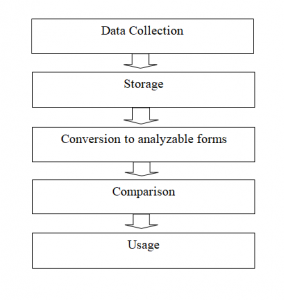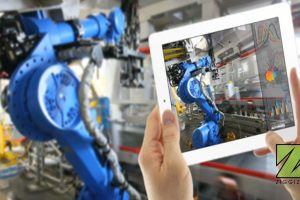Machine intelligence is a term coined to depict advanced computing that enables a machine to interact intelligently with its environment depending on certain responses received from its work environment.
Machine Intelligence as a whole utilizes two different terminologies, Machine Learning (ML) and Artificial Intelligence (AI) to have subsequent applications in fields as diverse as Smart Manufacturing, Autonomous Vehicles, Inventory Management, Supply Chain Management, Drive systems for automation and smart networks, Business and Customer Relations.
As the name suggests, the basic aim of Artificial intelligence is to replicate knowledge, skills and abilities that would otherwise require human intellect and subsequently require human intervention. AI is defined as the system’s ability to correctly interpret external data, to learn from such data, and to use those learning’s to achieve specific goals and tasks through flexible adaptation.[1]
Machine learning enables computers, machines and systems to learn in a way analogous to humans.
The application of a combination of the above technologies helps automate and make processes more efficient. Machine Intelligence gives the necessary support to execute tasks and rationalize decisions without the need for human intervention.
A Layman’s Overview:
A complete cycle has an input, an intermediate process and an output. Data is generated in every process/ step, but most of the times this data is not put to use. In simple words, collecting that data, analyzing it, and implementing a corrective action based on that data to improve a process, when done by a machine can be termed as machine intelligence
This is similar to how a child learns to recognize a face, not by teaching, but by observing hundreds of faces and being able to distinguish between a face and other objects.
Some of the ongoing trends and applications of Machine Intelligence in diverse fields are discussed below:
A. Machine Intelligence in Businesses:
In businesses, it is a common practice to analyze data and feedback and make decisions. The exponential rate at which technology has advanced has increased the ability of machines to store and process data, which has apparently made it cheaper and easier to integrate machine intelligence to businesses. Fraud detection and financial services are also some examples.
B. Machine Intelligence in Automobiles:
1) Self-driving cars (driverless cars)-Autonomous vehicles are fitted with numerous sensors, radars and cameras to capture massive amounts of data from the surroundings which when applied with AI, enables the vehicle to virtually see, hear, think and make decisions just like a person would do.
2) Adaptive Cruise Control- Due to this technique, the road vehicles will be automatically able to adjust and maintain the vehicle speed and maintain a safe distance from a vehicle up front with the help of on-board sensors.
C. Machine Intelligence In Data Mining And Analytics:
The practice of examining large pre-existing databases in order to generate new information.
- Blockchain: A system which maintains records of cryptocurrency transactions across a peer-to-peer network.
- Bio-Medical Informatics: With the use of algorithms and software, analysis of complex medical data has become easy.
- Information Extraction and Visualization: With the help of Natural Language Processing (NLP), modeling human language has become easier.
- Governance: Jacksonville, a city in USA uses data analytics and Machine Intelligence to manage intelligent streetlights which modulate the brightness of each light depending on traffic and pedestrian movements collected by street cams.
- R&D and Quantum Computing: Artificial Intelligence and Machine Learning, dedicated software and hardware play a major role in accelerating tasks in MI.
D. Machine Intelligence in Industries:
- Predictive Maintenance: The aim of predictive maintenance is to predict when an equipment failure might occur and to prevent the occurrence of failure by giving a maintenance warning.
- Inventory Management – Automated Procurement: Good inventory management implies keeping enough stock in the warehouse to ensure the business keeps moving.
- Supply-chain Management & Demand Forecasting: Supply Chain Management along with AI enables an organization to integrate the cyclic processes of acquiring materials, converting them into finished goods, and delivering them to the end user.
- Yield/Process Optimization: There can be sudden and unplanned occurrences in manufacturing industries. This can cause the production to stop. These situations can be harmful and expensive. Machine Intelligence can predict such occurrences and thus help in minimizing it. This can optimize the production/process.
- Early Warning Systems: Artificial Intelligence allows the industry to take rectification steps on time and prevent untoward accidents. This need-based repairing of machinery plays a great role enhancing the lifespan of industrial machines.
Methodology:
To understand the concept of Machine Intelligence, we have to first understand what is it’s methodology and components.

Principles of Machine Intelligence:
Value Alignment: Systems with machine intelligence should be designed so that their goals can be analogous to human values. Intelligent systems should be designed and operated such that they are compatible with human dignity, rights, freedom.
Human Control: The extent to which Intelligent Systems are able to make decisions should be chosen by humans
Personal Privacy: People should have the right to access, manage and control the data they generate. The Intelligent systems’ power to analyze and utilize the data must not intrude one’s personal privacy.
Repetitive self-improvement: Intelligent systems should be designed to be able to self-improve so as to increase quality under strict safety and control measures.
Shortcomings:
With every advanced technology that becomes available, the risk of misuse needs to be examined. Lapses in cyber-safety make the collected data vulnerable and subject to misuse. These ethical issues are more relevant for Machine Intelligence given that it is a decentralized phenomenon, wherein companies and institutes with access to much data have an upper hand. Ethical concerns around the development and use of AI are to be taken seriously. AI systems can be deliberately hacked. Such concerns have led to development of laws, principles and standards to promote the ethical use of AI.
Conclusion:
The right combination of hardware and software gives the convergence of Computerization and automated industrial procedures as they run parallel go hand-in-hand. The techniques of Artificial Intelligence and Machine Learning are applied extensively in day-to-day life. Intelligent machines and adaptive software are the future of not just the industry but various major streams. Data might just be the most valued resource in the near future and it will have huge potential in IT, marketing, finance, businesses and industries. Big data analytics and cloud computing architecture ensure flexibility and scalability.




